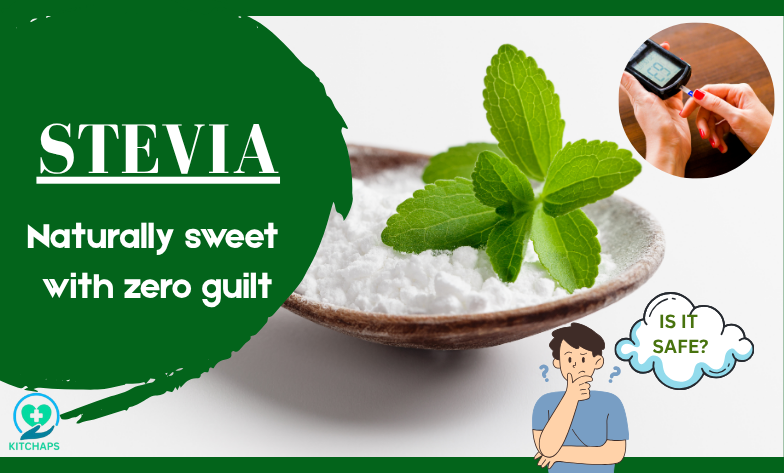Stevia is a natural sweetener plant that is popular for its extreme taste and offers various health advantages. It gives a sweet flavor with zero calories, carbohydrates, and effect on blood sugar level. The consumption of sugar is a continuous investigation around the world, and the search for healthy, natural options has escalated. Stevia has appeared as a major choice, attracting fitness freaks, patients with diabetes, and someone who want to decrease their sugar intake. But there are some queries or questions regarding stevia.
This blog will guide you through all the information about its benefits, side effects, is stevia bad for you, and much more.
Origin of the Stevia Plant
Stevia originates from South America, particularly in the areas of Paraguay, Brazil, and Argentina. Guarani (indigenous people) used it because of its sweetness and health-related benefits. They use it for making the sweet taste of their classic mate tea as well as for treating various diseases, such as digestive issues and skin issues.
In the 19th century, South America noticed it. Moises Santiago Bertoni (Swiss Botanist) recorded its unique features in Paraguay. In the 20th century, the French chemists hid the sweet composite (Stevoil Glycosides) accountable for the extremely sweet taste. The plant was named Stevia Rebaudiana Bertoni in honor of Bertoni and Ovidio Rebaudi (Chemist). He first took it out and recognized its sweetness.
What is Stevia?
Stevia refers to the plants that offer sweetness from their leaves. It belongs to the Asteraceae family like sunflowers. Stevia contains the steviol glycosides, a natural composite that is 50-450 times sweeter than regular sugar we consume, still virtually it does not have calories.
In stevia leaves, there are 60 known steviol glycosides, but the most important are Stevioside and Rebaudioside A. These are the composites used for a sweet and a bit of herbal taste. Stevia is accessible in many forms:
- Dry leaves
- Green Stevia leaf powder
- Liquid extract
- Purified steviol glycoside powder
Health Benefits of Stevia
Stevia, reported as a healthy replacement for sugar, has various advantages, but it is important to distinguish the supported claims from the statements that are overstated.
Here are some of the health benefits that are acquired by the consumption of Stevia:
Diabetes: It does not increase the blood sugar levels. Making stevia a famous choice for Type 1 diabetes and Type 2 diabetes patients. Unlike sugar, these sweet composites are not metabolised in the body, outcoming an insignificant effect on insulin.
Weight Management: It contains no calories, by replacing sugar with stevia helps in decreasing the calorie intake. These replacements help in controlling weight, but the proof is limited. Stevia is a part of the diet, but it is not a magic for weight loss.
Dental Health: It does not contribute to tooth decay. By making it a good option for sweet foods and drinks.
Antioxidant Properties: Some research suggests that antioxidants as well as anti-inflammatory impacts, but the discoveries are based on animal studies, not on human consumption.
Not impacting Blood Pressure: Recent studies say that it might lower the BP, but the large studies say it does not show steady results. For some people, stevia does not affect blood pressure.
Caution: Some sources are overstating the health benefits of stevia, focusing to diabetes, weight loss, and cancer. But it is used for decreasing sugar intake and not viewed as a cure.
Is there any Side Effect of Stevia?
Is it bad for you? Some people consider it safe if used in moderate quantities, but if it is used in large amounts, then it has some potential side effects that are:
Digestive Problems: Some people experience bloating and gastrointestinal issues, particularly the products that contain stevia and sugar alcohols such as erythritol.
Allergy: It is rare but possible for those who are allergic to Asteraceae family plants like sunflowers and daisies.
Hormonal Impact: Some troubles have been increased in some animal research, but the recent studies do not specify the risks or threats for humans at moderate utilization levels.
Gut Health: Studies indicate that it may disturb the bacteria that are present in our gut and disrupt the microbial balance. However, it leads to signs of gastrointestinal problems and affects the digestion.
Impacts the Liver: According to some animal studies, the high consumption of stevia is related to stress on the liver, even if the particular amount for humans is unknown.
How is Stevia Used?
Stevia is multifaceted as well as naturally sweet. It is used in many ways because of its sweet taste and steadiness. The main uses are:
Baking and Cooking: Stevia is used as a replacement for sugar in various recipes. But because of its extremely sweet taste and lack of texture, some adaptations are required for this by including some bulking elements.
Processed Foods: Many products that are labelled as sugar-free or diet products involve soft drinks, yogurts, as well as snacks. They use stevia in it.
Tabletop Sweetners: It might be used as a replacement for sugar in coffee, tea, and in other beverages too, at various restaurants and home.
Medicinal and Cosmetic Uses: It is often used in skin care products and traditional herbal remedies. It gives various benefits to your skin and health. Still, in South America, stevia leaves are used to make the tea sweet and in herbal remedies.
Tip: Stevia is extremely sweet as compared to sugar, so always try to take it in small amounts and adapt to the taste.
Is Stevia bad for you?
The question arises, “Is stevia bad for you?” Sometimes, because of the mixed resources in the media as well as online misconceptions arising. So, here’s what you need to know:
Stevia extracts are highly purified: The primary health authorities, such asthe FDA, EFSA, and WHO accepted only highly purified stevia extracts as safe. The unrefined stevia extracts and leaves are not accepted because they may contain the elements related to allergy.
Stevia Blends: Such as blended with erythritol, are related to heart-related risks according to some research, but these threats are related to erythritol and not to stevia.
For some people, stevia is safe and good replacement of sugar, if consumed in moderate amount. If you have any allergy and particular health condition then always consult your doctor.
Stevia Sugar Vs. Regular Sugar: How does it compare?
Stevia Sugar is used for business purpose, that is a combination of purified stevia extracts and with bulking elements like erythritol for the texture and sweet taste. The mixtures are famous because of pure stevia is extremely sweet and have a bitter taste later.
| Feature | Stevia | Sugar (Sucrose) |
| Calories | Zero | High |
| Blood Sugar | Safe for diabetes patients | Not safe |
| Glycemic Impact | Minimal | High |
| Taste | Sweet | Familiar |
| Baking | Associated with recipe | 1:1 |
| Tooth Decay | No | Yes |
Is Stevia safe?
Safety is examined by various international health authorities, such as:
- FDA (Food and Drug Administration): It accepted only highly purified steviol glycosides, which means not raw leaves, as GRAS (Generally Recognized as Safe).
- EFSA (European Food Safety Authority): According to EFSA, it is safe to consume if taken as established ADI (Acceptable Daily Intake). It also permits the steviol glycosides in foods and drinks, but with moderation.
Why was Stevia banned?
Stevia was temporary banned in some countries such as U.S. and in some parts of Europe because of the untimely trouble about its safety and not enough research. Other more studies confirms the safety and uplifted the bans for purified extract. While in some areas raw stevia leaves are banned.
Conclusion
Stevia gives captivating options to sugar. It is used as a replacement for sugar for those are suffering from diabetes, weight gain, or holistic health. While some early concerns emerged because of its use, and insufficient research. But some international authorities have accepted it as safe for regular use, in moderate amounts. Well-informed choices and a limited amount are the primary.
Disclaimer: This blog is for knowledge purposes only and does not involve any medical advice. Always consult your professional doctor before making any important changes in your diet, particularly if you have any health conditions or are pregnant or breastfeeding. The author is not responsible for any inconvenience.

